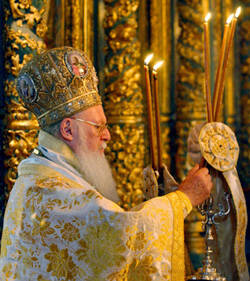Forward in Unity
From Oct. 10 to 12, a synaxis (gathering) of patriarchs, primates and representatives of the Orthodox Church was held at the Phanar in Istanbul under the presidency of His All Holiness Patriarch Bartholomew I. He opened the assembly with an exhortation to unity:
“Dearly beloved brothers in the Lord, we are called to contribute in every possible way to the unity of the Orthodox Church, transcending every temptation of regionalism or nationalism so that we may act as a unified Church, as one canonically structured body.”
The fathers issued an inspiring, forward-looking document that signals special overtures to other Christian churches. The themes treated by the synaxis will have a familiar ring to Roman Catholic Christians. Pope Benedict, too, has been reminding us regularly of the need to overcome conflicts in the contemporary world, the need to resist the distancing of societal life from the life of faith, the need to protect the environment and the need to foster the sacredness of the family and marriage.
This convergence of pastoral concerns is a welcome development. We pray that it will advance ecumenism between East and West.
Encourage Savings
In 1974 and again in 1980, Congress passed legislation to encourage taxpayers to save money for retirement. Individuals with earnings under a certain cap could sock away tax-deferred savings of up to $6,000 a year by purchasing a traditional individual retirement account. I.R.A.’s are long-term investments with early withdrawal penalties that can be passed on to a beneficiary if the owner dies and that are protected from bankruptcy. Traditional I.R.A.’s offer a short-term incentive (tax deferment on the initial purchase) and a long-term incentive (tax deferment on any gains). There are specific types of I.R.A.’s for small businesses (S.E.P.), those who prefer to pay taxes up front (Roth) and high earners (non-deductible).
A second plan, the employer-sponsored 401(k), allows workers to set aside earnings, tax-deferred, of up to $15,500 to $20,500 a year, which can be invested. In these difficult economic times, they should be promoted and expanded. The maximum I.R.A. contribution could be increased and the 401(k) ceiling raised significantly. And for I.R.A. holders who do not need their I.R.A. money yet, Congress should lift the compulsory withdrawal rule for persons age 70-and-a-half who prefer to let their savings recover from the recent market nosedive.
Government should promote new incentives for saving. The most obvious change would be in the current tax on interest on ordinary savings and money market accounts. Why not exempt the interest from taxes, or cut the rate to a minimum? Though such moves decrease federal tax revenues, they would increase the stability of lenders and bulk up the money available for the government’s own borrowing.
Just as government encourages charitable giving by exempting legitimate donations from tax, so it can encourage other habits: deferred gratification, long-term financial planning and thrift.
Gekko and Aquinas
“Greed is, for lack of a better word, good,” said Gordon Gekko, the arbitrageur-protagonist played by Michael Douglas in the 1987 movie “Wall Street.” There are two ways of interpreting the film’s most quotable line. If “greed” means the self-interest that serves as the engine of classic capitalism, as Adam Smith proposed, Mr. Gekko is arguably correct. Self-interest motivates workers and companies to maximize their earnings, and therefore increases productivity, which benefits the overall economy. But if by “greed” he meant what Pope Gregory the Great and St. Thomas Aquinas named as one of the seven capital sins, then Mr. Gekko was dead wrong. At the top of the list of sins that led to the financial meltdown is greed, with pride following close behind.
Greed (and recklessness) encouraged behavior by the top executives of many financial services companies that contributed to a predictable catastrophe. Greed led the mortgage industry to invite homeowners to take on mortages beyond their means. (There was not a little greed among those homeowners, too.) Theoretically, an “efficient” market should punish overweening greed: stock prices in companies that overextend themselves in risky ventures will fall. But with few executives able to understand precisely how these financial instruments worked, the opposite happened: stock prices rose. (That’s pride: the companies thought they could weather any storm.) Though the risk-taking was excessive, C.E.O.’s were rewarded handsomely. The former head of A.I.G., Martin Sullivan, received a $15 million golden parachute; and last year Richard S. Fuld Jr., the former chief of the now defunct Lehman Brothers, received a $484 million salary. “Is it fair?” asked Representative Henry Waxman at the Congressional hearings. No, it’s sinful; and the sin is greed.








